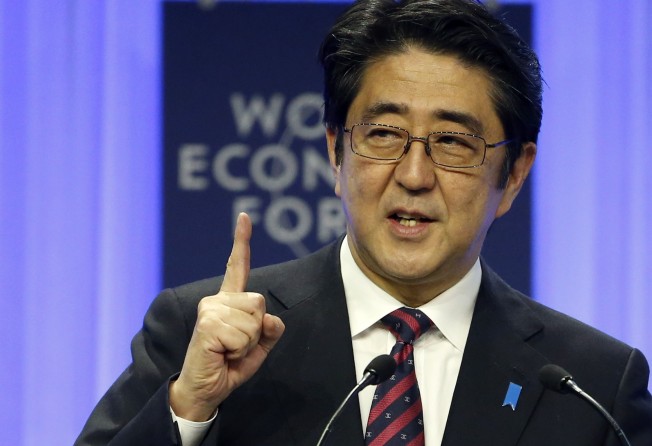Is he talking war or peace? Shinzo Abe comments on 'pre-war UK, Germany' irk Chinese netizens
Japanese Prime Minister compared tensions with Britain and Germany’s relationship prior to the first world war

Japanese Prime Minister Shinzo Abe’s comments during his trip to the World Economic Forum comparing Sino-Japanese tensions with Britain and Germany’s relationship prior to the first world war has sparked heated discussions within the Chinese online community.
In response to a question posed by the Financial Times in Davos on Wednesday night about whether a war between China and Japan was “conceivable”, Abe compared the tensions between the two countries with that of Britain and Germany prior to 1914, who despite having a strong trading relationship were not prevented from going to war.
Abe was quoted by the blog as observing that China and Japan were now in a “similar situation”.
Abe’s remarks on Britain and Germany echoed the oft-quoted Chinese description of Sino-Japanese relations as “politically cold and economically hot,” outlining the phenomenon that while the two countries maintain a thriving trade volume which reached US$312.5 billion in 2013, tensions between China and Japan are currently the greatest they have been in years.
A bitter row between the two nations over disputed islets in the East China Sea continues with frequent reports of confrontations between military ships and scrambled jets. The relationship has also been damaged by rows over historic issues during the second world war, and more recently the Japanese leader’s controversial visit in December to the Yasukuni Shrine, a shrine that honours Japan’s war dead, including indicted war criminals.
Abe, the first Japanese prime minister to deliver the keynote address at the forum, said: “I paid respect to those people who perished in the war for the nation…which I believed is something quite natural for a leader of any country in the world.”
He also called for military restraint in Asia. “We must ... restrain military expansion in Asia, which could otherwise go unchecked,” he said.
“Military budgets should be made completely transparent and there should be public disclosure in a form that can be verified," Abe added in remarks apparently alluding to China.
Abe’s comments drew a barrage of criticisms from online users in China.
“Is this a challenge from Japan to China?” one online user questioned on his microblog.
“Even if China really publicised its military budget, Japan wouldn’t believe it anyway,” another said.
Others viewed Abe’s remarks on his Yasukuni Shrine visit as an excuse for refusing to apologise for the Japanese invasion of China during the second world war.
One user said Abe should be allowed to visit the shrine as long as he “kneels in front of the memorial hall of the victims of the Nanjing Massacre in the second world war”, as former West German Chancellor Willy Brandt did during a 1970 visit to a monument in Warsaw, Poland to the victims of the Ghetto Uprising of 1943.
“Abe’s remarks are a counterstrike towards Chinese diplomats’ worldwide condemnations of him,” Richard Hu, an associate professor of the University of Hong Kong who specialises in East Asian international relations, said in an interview with the South China Morning Post on Thursday.
China and Japan have been engaged in a war of words since Abe’s controversial visit to the war shine. Chinese diplomats overseas have taken to international media to denounce the move, writing newspaper editorials condemning the visit in nearly 40 countries.
“So I think this is his [Abe] essential agenda in going to Davos,” Hu said.